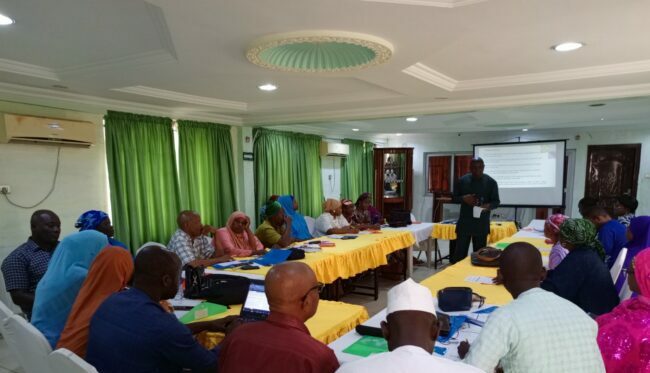
Family planning supervisors and monitoring and evaluation officers from the 16 local government areas of Kwara State and their counterparts in the state Ministry of Health have been trained on family planning indicators for improved reporting and empathy-based counselling for increased uptake of self-care DMPA SC in the state.
The two-day training programme on the Data Strengthening Capacity Building Meeting was declared open by the Permanent Secretary, Kwara State Ministry of Health, Dr Abubakar Olayiwola Ayinla.
The meeting is at the instance of the Delivery Innovation in Self Care (DISC) project, with funding from the Children Investment Fund Foundation (CIFF) and implemented by the Society for Family Health (SFH) and Population Services International with support from the Federal Ministry of Health, The Challenge Initiative, and MSI Reproductive Choices.
Speaking at the event in IIorin on Tuesday, the Social and Behaviour Communication Coordinator, a staff member of the Society for Family Health, Michael Olubunmi Titus, explained that the DISC project is working with the Kwara State Ministry of Health to scale up quality self-care options in SRH, starting with DMPA-SC self-injection.
“There are different modern methods of family planning, e.g., condoms, oral pills, injectables, implants, and intra-uterine devices.
The duration of these methods varies from daily to two-monthly, three-monthly, and 3-5 years.
“The DMPA-SC Self-Injection we’re talking about here is a three-month injectable. This enables women to take their family planning services into their own hands or do it themselves.
“The health provider trains the women at the health facility, where she self-injects at least twice; after she’s ascertained competence, they’re provided with the take-home injection to last her for another 6–9 months. The DMPA-SC is also available in pharmacies at an affordable cost.
“A woman can now inject on her own time and in places where she feels safe and comfortable.
It reduces her three-month visit to a health facility, which draws attention to her health-seeking behaviour.
Her use can be more private and confidential (it can be done in her bedroom, office, shop, etc.).
“It has been discovered that different jobs women do may prevent them from visiting a health facility for re-injection or their next appointment after their family planning method expires”.
“It also reduces lengthy trips to facilities and/or lengthy waiting times; one up-front visit to a provider for training in how to self-inject can mean that, after that point, she can go to nearby outlets as part of her regular trips to the market to get new units as needed. She can then re-inject herself without interrupting her day.
“Sometimes women had to queue for some hours when they visited a health facility for family planning.
But when she has been trained on SI, it reduces clinic visits, so this affords them the power to take responsibility for their health”.
“Training men and women on self-care interventions increases the opportunity for the country to achieve Universal Health Coverage (UHC).
It helps to reduce the workload of health providers, more so with the dwindling number of health providers in the country occasioned by exodus, retirement, and inadequate funding”.
“The self-care contraception would have helped individuals and families to prevent many of the unplanned pregnancies recorded during COVID-19, as many women avoided the health facility when their method expired because they were afraid of contracting the virus at the health facility.”
The SFH representative, who said that the injectables are provided at government facilities for free, added that it is less than N1,000 at the pharmacy.
“Child spacing or family planning is a voluntary decision made by an individual or a couple on when to get pregnant, the number of children to have, and the intervals at which they want to have children.
It is done by choice and not by mistake (without leaving one’s family to chance).
It reduces the possibility of having risky pregnancies (women are more at risk when they give birth back-to-back).
It helps a couple to have a number of children they can conveniently feed, clothe, and educate. It improves the health and survival of the mother and child through the spacing of pregnancies.
It reduces the number of abortions overall, especially unsafe abortions for married and unmarried women.
It allows women and girls to attend school and work to better their own future and that of their families. In a nutshell, family planning helps to save the lives of women and their families.”
Also speaking, the Assistant Chief Statistical Officer in the Federal Ministry of Health, Toye Femi, encouraged the state government to sustain the health project, which he said that SFH and other development partners had funded for about five years.
He said that this capacity-building programme is being carried out in 12 states, adding that it is being rounded off in Kwara, Akwa Ibom, Abia, and Plateau states.
Alhaja Bilikis Ibrahim, Family Planning Coordinator, Kwara State Ministry of Health, said that the programme is part of various activities of the state government aimed at encouraging modern family planning methods among women in the state.
She said that the programme, which started in five local government areas, is being extended to 16 local government areas.
She also said that the programme is aimed at promoting and empowering women in their reproductive health, adding that the training programme would also improve the skills and knowledge of the health providers towards achieving quality health delivery in the area of family planning.
YOU SHOULD NOT MISS THESE HEADLINES FROM NIGERIAN TRIBUNE
‘We want to go back to school’: Untold story of out-of-school kids in Ibadan
One of the kids who spoke to our reporter, Saheed Abiodun, ran away from home to look for succour in…
Mali, Burkina Faso deploy warplanes to Niger Republic, meet on response to ECOWAS military threat
AMID mounting pressure by the Economic Community of West African States (ECOWAS) to restore civilian rule in the Niger Republic, Burkina Faso and…
FG appoints 11 new CMDs for federal medical facilities
Federal Government has appointed 11 new Medical Directors for the Federal Government established Medical Facilities in…
#BBNaijaAllStars: Biggie pulls another twist, introduces 4 new housemates
During the Sunday live eviction show of BBNaija, host Ebuka Obi-Uchendu unveiled a new twist that…
Employment racketeering at FCC
IF there was any scintilla of doubt that the civil/public service in the country is a cesspit of corruption, the recent scandalous revelations of…
Messi becomes most decorated footballer after winning record 44 titles
Following his Leagues Cup title wins with Inter Miami, Argentina captain and World Cup winner, Lionel Messi has..
WATCH TOP VIDEOS FROM NIGERIAN TRIBUNE TV
- Let’s Talk About SELF-AWARENESS
- Is Your Confidence Mistaken for Pride? Let’s talk about it
- Is Etiquette About Perfection…Or Just Not Being Rude?
- Top Psychologist Reveal 3 Signs You’re Struggling With Imposter Syndrome
- Do You Pick Up Work-Related Calls at Midnight or Never? Let’s Talk About Boundaries






